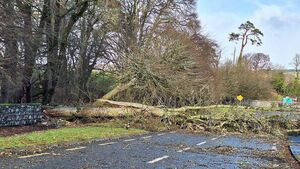Anguish goes on for thousands of people in county

A tree blocking the relief road between Boyle and the N4 beside Abbey Park GAA grounds during Storm Éowyn. The storm has not just taken a heavy toll on the county's infrastructure but also on people's mental health. Picture: Shirley Cunningham Cooke
As we write this on Wednesday, thirteen days after Storm Éowyn, the anguish goes on for thousands of people across Roscommon who are still without power, and many in cases, without water.
In the aftermath of the storm, the initial focus was on the scale of the damage inflicted on infrastructure but the attention has now firmly switched to the misery many communities are continuing to endure.
For those still affected, this has become a humanitarian crisis, especially for the vulnerable, the elderly and for families with young children.
Over the last week or so, we have heard many distressing stories of elderly people now fearful of living in their own home without any heat, light or water.
We have heard harrowing accounts of people with disabilities, young and old, whose lives have been turned upside down by this crisis. There’s no doubt that this traumatic event has taken its toll on people’s mental health.
Thankfully, the rallying spirit within communities has provided some hope for people who see each day as a living nightmare. Credit to all those who continue to volunteer many hours to ensure that the helping hand has never been too far away.
We must also be reminded of the good work carried out by council staff and ESB and Uisce Éireann personnel as the challenge continues to restore normality to people’s lives.
We are also hearing the many stories of how the widespread power outages have caused incredible disruption to businesses and schools. The Old Stone House Restaurant in Ballinlough is one of many cases; it was forced to dump about €15,000 worth of food which had been refrigerated. Meanwhile, St. Attracta’s National School in Ballaghaderreen with 300 children had to close for almost a week while many areas of the town had their power restored.
Politicians, Government ones in particular, have become the lightning rod for criticism and anger and the level of advance preparations ahead of the storm is already coming under sharp scrutiny.
At a local authority meeting last week, several councillors spoke about the destructive impact of fallen trees on power lines. This is clearly a crisis issue that needs to be addressed as quickly as possible for rural communities. This will include considerations such as forestry setback standards, maintenance and management, and the possibility of installing underground cables.
What this storm has brought home most forcibly is that communities have also been the victim of creaking infrastructure, neglected by years of underinvestment.
Let’s hope that the national debate on Storm Éowyn will ensure that the next severe weather event won’t bring as much distress to so many people.





